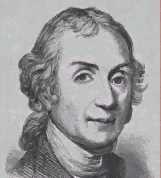

1 Reverend Dr Joseph Priestley was born on 13 March 1733 at Fieldhead, Birstall, near Leeds, one of six children of a cloth dresser. He died on 6 February 1804 at Northumberland, Pennsylvania, USA.
2. Always a non-conformist, Priestley gradually developed a Unitarian position: initially he questioned the doctrines of original sin, atonement, and the Virgin birth, then accepting the Arian heresy that Jesus was divine and pre-existent but not equal to God the Father; finally he became a Socinian, believing that Jesus was simply a man. His theology was, however, always Bible based and he retained a belief in Biblical miracles and the physical resurrection of Jesus.
3. He is credited with contributing to the growth of Unitarianism on both sides of the Atlantic.
4. Since as a dissenter he was barred from Oxford or Cambridge, Priestley studied from 1752-55 at Daventry Academy. After unsuccessful ministries at Needham Market and Nantwich, he was appointed tutor in languages at Warrington Academy in 1761 where he remained until 1767.
5. Priestley�s most important ministries were at Mill Hill Chapel, Leeds (1767-1773) and at New Meeting, Birmingham (1780-1791) being forced out of the latter by the riots of July 1791. Between these two ministries he served the Earl of Shelbourne as librarian, literary companion and tutor to the Earl�s sons.
6. Although he was not the immediate cause of the Birmingham riots, Priestley was their most harmed victim. His well-known anti-Trinitarian views and his support for the principles of the French Revolution (his Letters to Burke voicing this support were published in January 1791) meant that he had long been openly condemned by the Established Church there. Two things provoked the mob: a seditious handbill had been published in Birmingham celebrating the achievements of the Revolution and urging �every enemy to civil and religious despotism� to mark Bastille Day, 14 July, by demonstrating against their �oppressors�. It had the opposite effect. Then a group of gentlemen dissenters (Priestley was not among them) held a dinner on Bastille Day itself at a Birmingham Hotel. Whilst they escaped before the rioters arrived, the windows of the hotel were damaged. Then the mob set about destroying the dissenters� chapels, Old and New Meeting, before attacking Priestley�s home; it was destroyed as was his laboratory; he lost his priceless library of books and his irreplaceable collection of manuscript writings. In the four days of destruction, the homes of other leading liberals and dissenters were wrecked. Priestley and his family had fled before the mob reached his house. He never returned. In a letter immediately after the outrage to the Birmingham newspaper, Priestley blamed the actions of the rioters on the teaching they had received from their �superiors�.
7. Priestley�s contribution to Science - and especially to the chemistry of gases - was remarkable and his legacy informs our understanding today. Self-taught, he identified oxygen although it was left to a contemporary, Lavoisier, to name it and to understand it fully. He discovered the principle of photosynthesis, was the first to make �pop� by introducing carbon dioxide into water, and identified nitrous oxide (laughing gas) which is still in use as an anaesthetic. Whilst he was able to pursue his experiments at Warrington, Leeds and Birmingham (where he was a member of the Lunar Society), his years with Lord Shelbourne were especially valuable, giving him greater time and facilities.
8. Priestley�s interests were wide ranging and he wrote and published extensively on many topics including political theory and grammar as well as science and theology. He was opposed to the slave trade and to the test and corporation acts which barred all but communicant members of the Church of England from taking degrees at Oxford or Cambridge, representing a consituency in Parliament or holding government office. He advocated state education a century before it came into being. His Essay on Government (1768) is said to have provided the Utilitarian philosopher Jeremy Bentham with his phrase, �the greatest happiness of the greatest number�.
9. Priestley was awarded an honorary degree from Edinburgh University in 1765.and was elected a Fellow of the Royal Society in 1766.
10. Priestley�s last years as a virtual exile in America were rather sad and lonely. His sons had gone to America before him and he and his wife emigrated in 1794 settling in Northumberland, Pennsylvania. His youngest son died in 1795 and his wife in 1796. Nevertheless, Priestley won the admiration of his contemporaries, Thomas Jefferson and John Adams, both of whom served as President of the United States